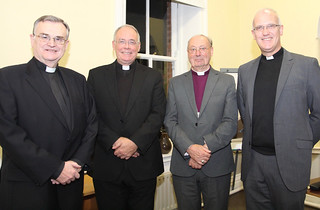Photo above – Canon Dr Ian Ellis, Monsignor Mark Langham, Bishop Christopher Hill and Canon Dr Maurice Elliott, at the seminar on receptive ecumenism.
The concept of receptive ecumenism was explored at a seminar in the Church of Ireland Theological Institute on Wednesday October 9. The event drew a wide audience of people interested in ecumenism from the Anglican and Roman Catholic traditions and beyond. It was run by the Anglican and Ecumenical Affairs Working Group of the Church of Ireland Commission for Christian Unity and Dialogue.
The focus of the evening was the latest report of the Anglican–Roman Catholic International Commission (ARCIC III), Walking Together on the Way. ARCIC members Bishop Christopher Hill of the Church of England and Monsignor Mark Langham, Roman Catholic Chaplain at the University of Cambridge, gave interesting insights into the background of ARCIC III and into the outworking of receptive ecumenism in its discussions.
Receptive ecumenism is the principle that asks first what one’s own tradition can learn from another rather than asking what other traditions can learn from one’s own. Introducing the evening, chairperson Canon Dr Ian Ellis quipped that while many a difficult matter in church life could be dealt with by responding that ‘that would be an ecumenical matter’ he was sure that the two well placed speakers would explain everything.
Monsignor Langham told the gathering of the difficult background to the third phase of ARCIC, the viability of which had been questioned following a series of developments in the Anglican Communion which led Rome to query who its dialogue partners might be. However, he added, there was also a realisation that it was at difficult times that it was important to talk. He said that the ecumenical crisis was one of authority and ARCIC III was charged with examining authority on universal and local levels (they later included in regional authority), and how, in communion, decisions were made.
He said that receptive ecumenism demanded a preparedness to look at things that were overlooked in one’s own tradition and what might be better developed in the other tradition. “Receptive ecumenism acknowledges honestly the diversity that exists and sees that as a strength. We can look at our own structures in the light of other’s,” he explained.
Bishop Hill outlined some of the decisive moments in the composition of Walking Together on the Way. Looking at decision making at local and universal levels, he pointed to the issue of the blessing of same–sex marriages and said ARCIC asked whether decisions to do so could be done at local or universal level. Exploring whether the Anglican Communion had any instruments through which it could make such a decision on a universal level, it was decided that it did not. “The Instruments of the Anglican Communion do not have universal jurisdiction,” he stated.
They then asked if they should split ecclesial and ethical discussions and decided that they could undertake ecclesial learning through receptive ecumenism before proceeding to ethical discussions. They agreed that ecumenical agreements need not be univocal on everything, the could be duo or multi vocal but could not be equivocal. The difficult thing, he said, was deciding what it was essential to agree on and what was non–essential.
On the issue of morals, Bishop Hill, said there were issues where both churches taught the same thing – for example that slavery is an absolute evil. This was not always the case but the churches eventually got to the point of condemning slavery, he observed. This prompted discussion. “How does the unchanging church change its mind and which issues can the church change its mind on and which cannot be changed? A statement on ethical issues is not on the cards yet but we have started work on areas we agree on and what is not agreed,” he stated.
DraggedImage.911956386ec54d18a277fa6b0318c17d.png



